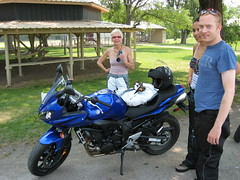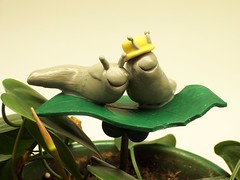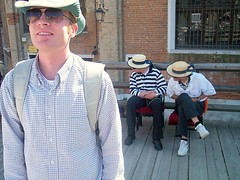Monday, November 12, 2007
Google Labs
The experimental ones weren't as impressive, but hopefully they will improve with feedback and the lab team. My favorites are:
Google Suggest, because it saves time typing and helps if you aren't sure about the spelling, or phrasing of a subject. I expect this lab to be put into use.
Google Ride Finder is a cool idea, and would be very helpful to those that find themselves in need of transportation quickly in a strange city with the use of a cell phone and internet.
Google Page Creator would be a terrific asset for many who know little about this task, but want their own web page. I didn't want to make a page, but it appears to be very user friendly for those that do. If it works as they claim, I think it would be greatly used by the public.
Google Mars was amazing and fun to explore. I don't know how many people would actually use it, if it went public, but maybe more than you think.
Google Music Trends was interesting. Fortunately they had an explanation on how it works and how to use it. I spent a fair amount of time looking through this one, and thought it was good to find new groups in a genre, but I was disappointed in the small amount of groups they had under each genre. Perhaps since the list is created and updated by the Google Talk listeners, it limits the music added, and the genre it's added to. They didn't list Techno, and the Electronic and Dance genres didn't fill that gap. This might be used a lot in the future, because it's a quick way to reach information about groups and new music, but I feel it would have to be improved to be more inclusive.
Friday, October 26, 2007
Using Web Applications
I immediately liked the Google Docs, because it's accessible directly from my Gmail account. But I discovered that we can't access Google Docs at home, because it will not work with Safari, which is what we have on our iMac at home. I could not find a spell check on the Google Doc site either, which is something ZOHO Writer did have, along with various options Google Docs didn't have.
Fortunately the Google Calendar does work at home, and after working with the Google Calendar I found it liked it better than the "30 Boxes" calendar application. I have already signed up for both. Google calendar was easy to use and I love the color coding. Not only that, but it's so easy to access right from Gmail. I am considering using an online calendar along with my staff to keep track of when everyone is scheduled and to keep up with any changes. It would require having everyone on board for using it.
I rarely have need of a spreadsheet, but this is another wonderful option to have available free online. I can see this being helpful with organizations to keep of expenses and have databases available. For example, having the FOCL membership contact list available to everyone. Keeping the FOCL info here would be helpful to FOCL Board members, but I am always fearful of having private contact info available online. Anyway, there's exciting new stuff out there explore!
Thursday, October 11, 2007
Trying new search engines
Exalead had a nice format, but it didn't have relevent results for my seaches at the top.
Wink was just a people search, but it was easy to use.
Gravee turned out to be an interesting engine, but at first I couldn't get it to search. I thought it was requiring you to login and I didn't want to do that just to mess around with it. I went back later and it was working correctly. It had good results and even has a button to add a bookmark or claim the site, and asked if the results were relevent. I would go back and use this again, so I think it's my second favorite.
Clusty got better as I figured out some benefits in the left frame to choose a more relevent direction for the search.
Mooter was my favorite, because it had the most appropriate site results for my search. It had sub seaches for you to choose from depending on the direction you wanted to go in a graphic format, although, I did get into something very strange that I had a hard time getting out of that said it found viruses or worms and wanted me to download a program to stop it. I feared doing that too, and closed out of everything.
Yahoo was so much better than I remembered it. I never use it anymore. It even had dropdown search choices to help narrow your search. I found surpisingly good results from it and would say it was my third favorite of these engines.
Kartoo was really veird. It was very visual, but I found it very confusing the more I worked with it and tried different things. It would open a new page and offer more options. This one would take a lot more investigation. Perhaps with more time I would find it to be better than other search engines, given it's unusual graphic link options.
Friday, October 5, 2007
Library 2.0 and the future
Rick Anderson talks about the "just in case collection" as a thing of the past, and that we should move away from this concept. We are doing this with online reference databases and with e-books, but I do feel there will always be a need for the print format as there will always be people who want a book in their hands. It will be interesting to see how libraries will meet this need in the next 10 years. I agree we need to remove barriers between patrons and information, and with user friendly Web 2.0, it may be possible. There will continue to be those who resist anything to do with computers, and although we are moving on with or without them, they are our patrons and they are using our libraries. We can introduce them to the advantages of new technology and hopefully they will warm to the idea after seeing the benefits.
To show how things have already happened as predicted, I noticed in the 2006 OCLC article by Chip Niles that they planned to allow anyone with a Web browser to search all of WorldCat by spring of 2007. So, I went to WorldCat and looked up a title. I was able access WorldCat without authorization. It knew my location as Jefferson City and brought up libraries in my area to choose a catalog to search. Clicking MRRL brought up our catalog and I placed a hold on the item all within a few moments. I was impressed with the process.
The article called "Into a New World of Librarianship" by Michael Stephens describes the traits necessary for the librarian of the future. "This librarian" is Bill, "this librarian" is Robin, "this librarian" is Bobbi. They already believe in and have incorporated these ideals into our library currently and into future plans. They have invited us to join them by providing the MRRL Learning Library 2.0. Now we all have the opportunity to be "this librarian."
Wednesday, October 3, 2007
States visited
create your own visited states map
or check out these Google Hacks.
Somehow the entire map didn't show up on the blog. I'll see if I can find a way to change this. This was easy and fun. I hadn't realized I've been to 38 states!
Generators

Halloween greetings with the help of www.imagechef.com/
This was my favorite generator, because it was so easy and had so many options available without having to use personal photos. The Generator Blog was incredible, with so many different, crazy options. It would be great to try with personal photos that I have on my computer at home. Without those, I didn't feel I could create anything of much of interest. I suppose you could go out to Flickr or Google and find images, but that's pretty time consuming. I'll probably go back to the imagechef later on and create something different for MySpace. I tried three time to get a word search I made with a generator onto the blog by copying the HTML as it instructed to do, but the box showed up empty. This was the link. http://freewordsearch.teacherly.com/show/15873-Web+2.0.html
Wednesday, September 26, 2007
Really Simple Syndication
I like the LibraianInBlack blog best of the library blogs. The Librarians on Motorcycles is just for fun. I added good art blogs, which don't have anything to do with libraries, but ones I find interesting, my favorite being the NYT > Arts feed.
I found the various feed finders very different. Maybe I wasn't using Feedster correctly, but I got the same results when searching by Newsfeeds, Blogs and Podcasts with the word "libraries." I liked Topix best, once I figured out how to use it. I also didn't like Syndic8. In searching there I was asked for a password to authorize accessing a feed from API, but was able to access a blog on another try. It just didn't seem user friendly to me, but then again, maybe it was just me. Technorati was good, easy to use and from that I found a blog to add. I'm going to continue to look for other blogs of interest, now that I know how easy it is to do. I'm going to show this to my husband, and have him create a blogline account too, for things of interest to him. It saves time, keeps you posted, and its easy! The problem is finding time to read all that you have available to you!
Wednesday, July 4, 2007
My FZ6
I love it!
Wednesday, June 27, 2007
Flickr tool fun
Friday, April 27, 2007
Happy Spring!
I love it. It makes me want to be in our garden.
Flickr : )
Josh in Venice
Friday, March 23, 2007
Tags
Tags are a basic necessity for keeping track of your online information via bookmarks, but learning about them was confusing, and the more I read about them, the more confused I became! I found the Slacker Manager site with "Several Habits of Wildly Successfull Del.icio.us Users" to be a very helpful for those that know what they are doing, but it plunged me into doubt about what I thought I knew about tags. I did more investigation to see how they're used.
I think I finally have an understanding of how these work and the wonderful sites, such as Del.icio.us, that make it easy to use tags to mark your information for future reference. It's a very handy tool for placing tags on your bookmarks and other data, such as photos and blogs. The MRRL account was helpful to see how tags worked for keeping track of sites and relocating information. It would be an wonderful tool for anyone doing reseach, on their own or with a school, business, or project.
Technorati
It took a long time to access the video tutorial, but it was worth the wait. It was an excellent overview of this website, which exists to compile blogs and allow everyone to find blogs that are of interest to them. You can mark your favorites and rate the blogs. Browsers can add their blog as well. They have both "signed in" or "not signed in" ways to view the site. Someone who has heard about blogs, but doesn't know what's out there in the blogosphere or where to start, can be advised to come here to find blogs of interest to them for fun reading, or to look for information, or to even see the most blogged videos. Things are filed and seachable by subject or tags, or even a blog directory. The results were very different for searching Learning Library 2.0. I got 2,570 hits from using blog posts, 10 from tags, and 55 from blog directories, but it's very easy to check the different options for the same subject, so you can try all 3 to see what works best for your search needs. Truly amazing how many blogs are out there and the numbers are doubling every 6 months-unbelieveable! I thought this was an amazing site and very user friendly. I was going to claim my blog just for the experience and to use tags, but decided not to make my blog that public.
LibraryThing
I thought LibraryThing was incredibly cool for anyone that would like to catalog their own collection. I don't intend to do that, but since it was part of our Learning 2.0 program, I did open an account. Being a member to access the information others have shared about books, makes this a giant web book club, of sort. It's also very easy to catalog your books and to access information about them. Here is my account site. http://www.librarything.com/catalog/crowsnest
Friday, March 9, 2007
Got a MySpace!
Friday, February 23, 2007
Learning about MySpace
*What does your library plan to offer using this new service?
*What are the library’s goals for establishing this new service?
*Can the advertising be minimized by paying a fee or by choosing certain categories?
*Does the service meet the library’s strategic goals?
*Who’s going to maintain this new service?
*And most important: if it’s successful - what’s next?
The management team considered many of these when disussing a MySpace for the library.
There are other things you may not think of unless you have a lot of experience, which David apparently does. His point about patrons visiting a library MySpace that are not users of MySpace may not understand that the library is not running the banner ads, which considering some of the ads, could be an issue for Board members and administration.
It has also made me wonder how to encourage the public to become more aware of this new technology out there and available for them to use. Kim Radcliff Smith put it this way, "... should there be links to other kinds of intellectual stimulation for the users, such as a toolbar that contains links to SL, Google Scholar, Wikipedia, Blogger, and similar products?"
I really enjoyed a thread on LibrarianInBlack's blog. It contained a variety of views from librarians about libraries having a MySpace. Everyone would agree educating the public is number one to rid people of their fears and keeping users safe on social networking sites. Also, it would be nice if these social software sites would develop a profile template for groups instead of a library having an individual profile. There was concern that teens would view libraries as a authority figure invading their cool space. Others see it as validating their space. I feel it could let teens know libraries are keeping up with technology and are more than just buildings full of books.
Friday, February 2, 2007
A brave new wiki world
I would expect in the very near future to see all universities having a wiki, since it is an excellent way to share information about class schedules, classwork, class discussion, assignments, etc.
Since you are required to login to edit, or post, it seems the content would remain relevent and monitored, to some extent. A possible problem may be, and always remain, in getting people (staff, students and professors) to visit the wiki, read it and contribute to it.
The wiki seems perfectly matched to a library situation. Now that we have our own library wiki, we will have the chance to use it for a variety of things, such as committee reports, and see first hand how it will contribute to communitation between departments, staff and possibly the public. Robin has done so much with our new staff website and the intrawiki. Hopefully staff will visit the website often and see the changes and contribute. So far, the Learning Library has been very user friendly and will be a big help for all of us towards this goal.
Friday, January 19, 2007
I changed my blogspot address
I'm in!
The internet has become a major force in the world, both good and bad, and will only become more so in the very near future. People need to be aware of this new "web world" and its capabilities of reaching around the world in seconds, and understand the global aspects, ability to influence and its many applications. So, this is my introduction into this new world and I am very curious. Should be interesting!


